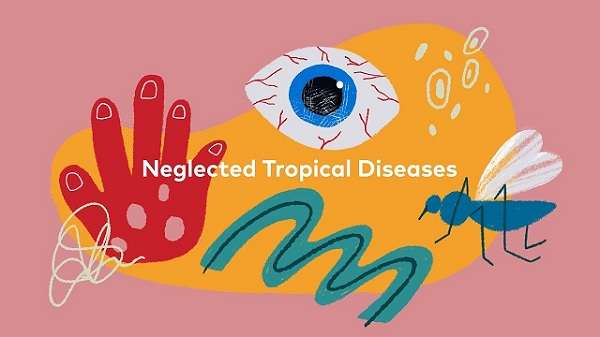
The Health Officials in Ondo, Ekiti and Osun states are not complacent or leaving anything to chance in their response to cases of Neglected Tropical Diseases (NTDs).
Neglected Tropical Diseases (NTDs) are viral, parasitic and bacterial diseases that mainly affect the world’s poorest people.
They are also regarded as a diverse group of communicable diseases that prevail in tropical and subtropical conditions in about 149 countries globally and affect more than one billion people across the world.
The diseases include Lymphatic Filariasis (Elephantiasis), Soil Transmitted Helminthiasis (STH), Onchocerciasis (River blindness), Trachoma (Granular Conjunctivitis) and Schistosomiasis (Bilharzia).
Others are; Rabbies, Leprosy, Yaws, Snakebites, Leishmaniasis, Human African Trypanosomiasis (HAT), Mycetoma and Fascioliasis.
Ondo State
The Ondo State Coordinator of the Neglected Tropical Diseases (NTDs), Mrs Olanike Oladipupo, said that the state government was working assiduously with all stakeholders in addressing cases of NTDs across the state.
In an interview with Journalists in Akure, the state capital Oladipo said “There is collaboration with the Ministry of Water Resources to ensure that everybody in the state has potable water to drink and use.
“We do enjoin our people to avoid the use of stream or ocean water. People can easily contract infection or diseases such as schistosomiasis and onchocerciasis from such sources because black flies lay their eggs there.
“Government is also working in earnest to clear drain channels across the state. There was a project carried out in recent time in collaboration with the University of Osun and Ondo State Government whereby some rivers in Ondo State were cleared.
“The aim of the project was to reduce black flies in some communities in the state. If there is reduction, the rate of bite and transmission will be reduced as well.”
The NTDs coordinator said that the Ministry of Environment was also educating residents of the state on proper disposal of their wastes, saying there was an aggressive campaign for adherence to environmental sanitation on regular basis to prevent outbreaks of diseases in the state.
According to her, the state government is in partnership with Mithosath, a Non-Governmental Development Organisation and UNICEF in addressing NTDs in the state.
“We have been collaborating with Mithosath, an NGO, and UNICEF so that there is proper dissemination of information about NTDs and the treatment across the 18 local government areas of the state.
“As it is known, government cannot do it all, other stakeholders should support.
“The partnership enables us to get to people at the community level and they are in charge of NTDs programmes, so that no one will be left behind about NTDs and what they can do to prevent the diseases and the treatment.
“In that, Mithosath is helping the state to ensure that people have access to preventive chemotherapy like worm repellants and other necessary things.
“Those are the drugs given to people during mass campaign. Nobody is paying for the drugs and it’s for everybody.
“Before we distribute, we carry out powerful advocacy in all local government areas so that people will come out in large numbers to access the drugs. And they will use them in our presence, that is Directly Observed Therapy (DOT).
“UNICEF is also doing a great job as regards this. It ensures hygiene promotion such as a programme called WASH, giving support to the government so that people will not bathe in rivers and streams nor defecate there. They also provide logistics,” she added.
Oladipupo explained that some of the NTDs could be prevented even without taking drugs, depending on one’s attitude to cleanliness and proper hygiene.
She said that through the partnership with the Mithosath many affected by NTDs across the three senatorial districts of the state had benefitted from surgical operations.
“There is Morbidity Management and Disability Prevention. This also goes to Mithosath in supporting the state. Some people that have hydrocele, that is swelling in their scrotum and those with lymphatic filariasis have access to free surgery.
“The phase one was done in Idanre in the Central Senatorial District and the phase two was done in Okitipupa in the Southern Senatorial District of the state while the third phase is ongoing now as I speak with you in Ikare Akoko in the Northern Senatorial District.
“The most common NTDs in the state are: schistosomiasis, which is a water-borne infection, lymphatic filariasis; onchocerciasis which is also known as river blindness and it is caused by black flies and soil transmitted helminthiasis, which is worm disease, and it is common among school age children.
“The state government has intervention of distributing worm tablets to them so that their growth will not be stunted,” she said.
Ekiti State
Also, the Ekiti Government says modern best practices at sustaining quick responses and preparedness to outbreak of Neglected Tropical Diseases (NTDs), among others, are being adopted by the state.
The Commissioner for Health and Human Services, Dr Oyebanji Filani made this known in an interview with the NAN in Ado-Ekiti.
He said Neglected Tropical Diseases, NTD’s are not new and as such are being tackled headlong.
“The state government therefore is doing everything humanly possible to prevent such diseases from escalating in identified communities.
“We are in collaboration with various multi-national agencies, among which is Mitosath, working with Ekiti State Primary Health Care Development Agency (ESPHCDA), to fight NTDs,” Filani said.
He assured that for now, Neglected Tropical Diseases are under control in the state
”Presently the state is distributing drugs, I mean mass distribution, to pre-school and school age children, to prevent transmission,” he said.
A community health doctor at the Federal Teaching Hospital, Ido-Ekiti, Dr Ipinmoye Taiwo, identified poor awareness, especially among people in rural communities, as a challenge to ending the spread of the diseases.
“The diseases are called neglected because they tend to affect the world’s poorest, and yet, receive less attention than other diseases,” he said.
He called on governments at the national and state levels to get involved in ending NTDs and its spread across the country.
Osun State
In Osun, the state government has put in place measures to fully monitor, combat and control any outbreak of diseases, Dr Abiodun Boladale, an official in charge of NTDs in the Ministry of Health, has said.
Boladale said that the department of public health in the ministry was on top of situation and highly prepared to respond to emergencies in the state.
“Lasa Fever and Covid outbreaks equipped the state for emergencies and presently we have emergencies operation centres in the state where diseases are monitored.
“NTDs are among the diseases we are monitoring on the dashboard of the centres.
“We also have ‘Integrated Disease Surveillance and Response Unit’, which form part of the team monitoring diseases relating to NTDs.
“We are working with Disease Surveillance Monitoring Officers and Disease Notification Officers at the local level to stay on top of diseases’ outbreaks in the state.
“We also have NTDs officers at the local level who keep the ministry informed and document diseases outbreaks.” he said
Boladale said in case of outbreak of NTD outbreak, the state would follow national guidelines in managing them.
He said some foreign partners and organisations, in conjunction with the Federal Government, had been providing drugs and other medical support to the state to handle NTDs.
The official said that the Osun State University recently received a research grant for Schistosomiasis, a major NTD peculiar to the state.
NAN










